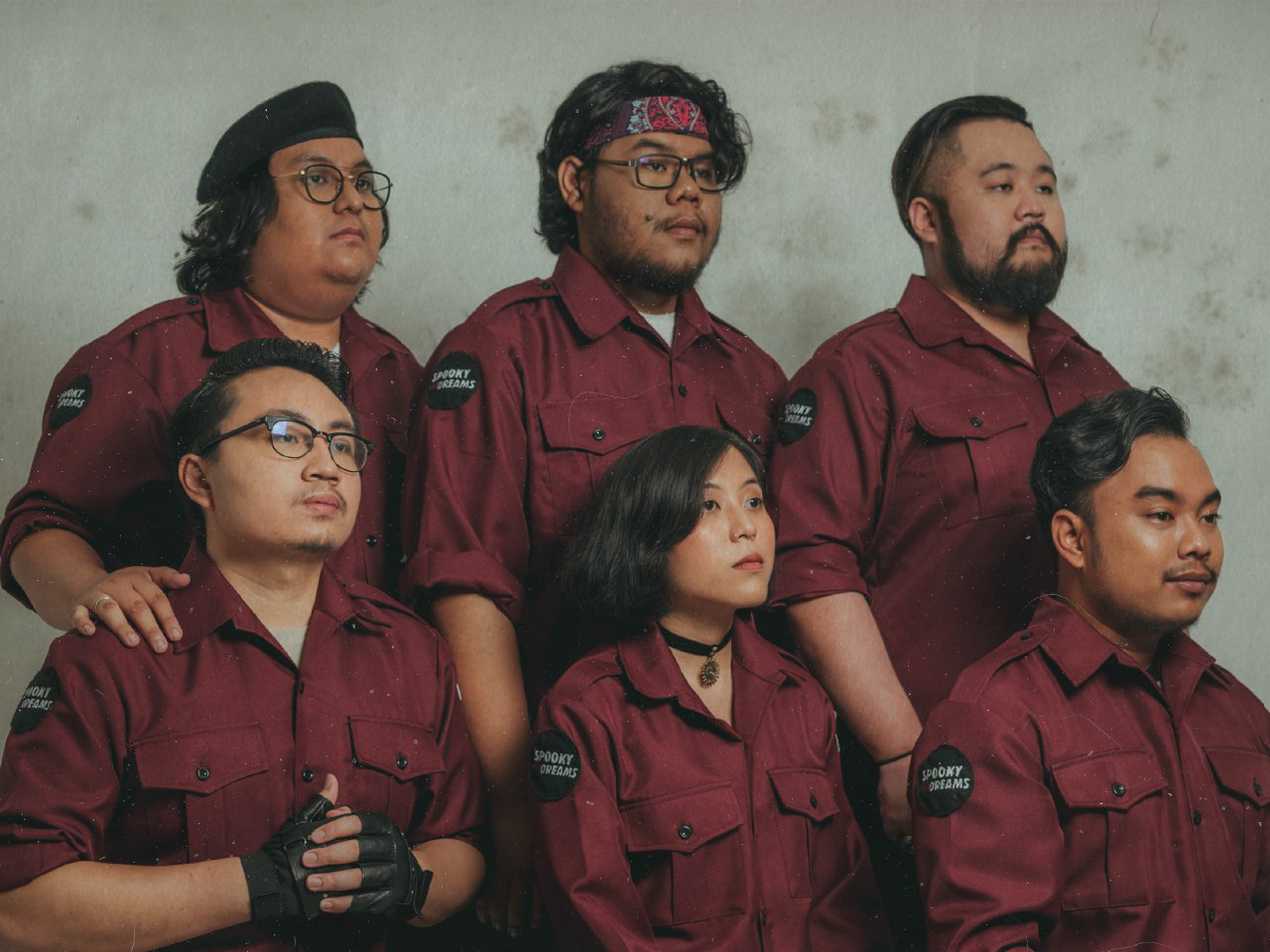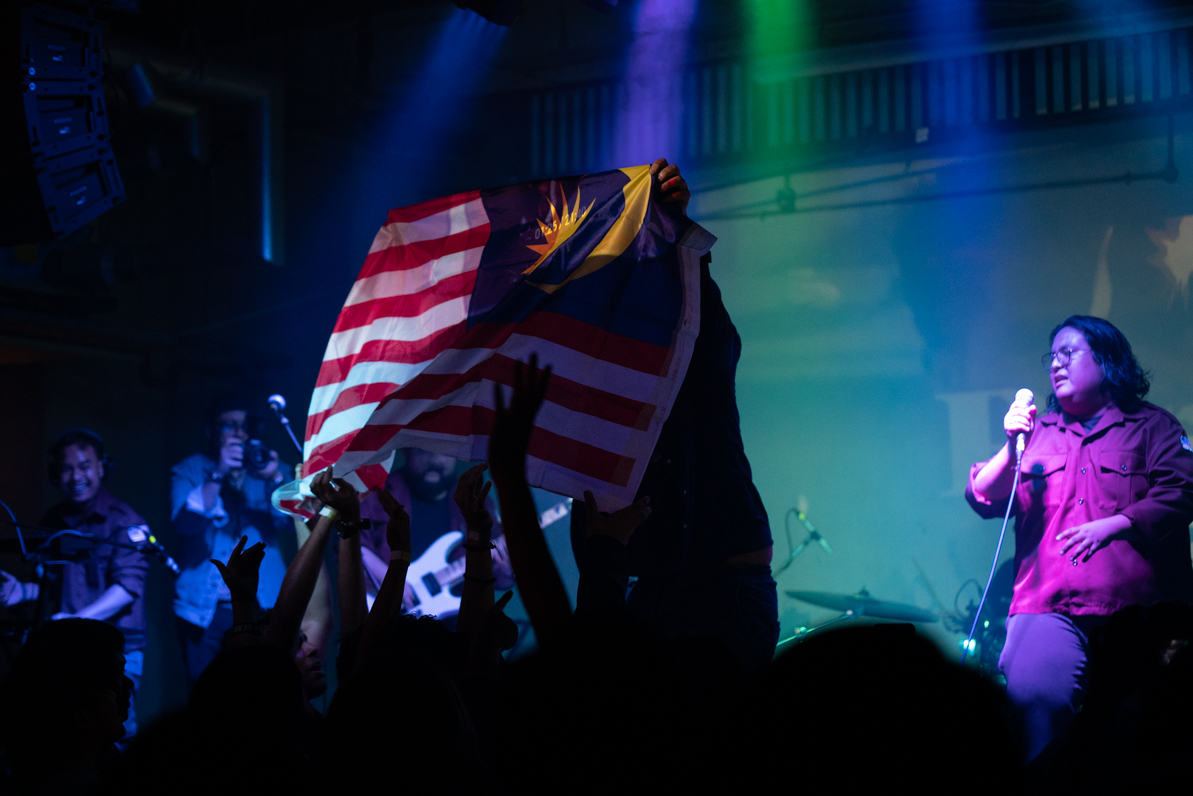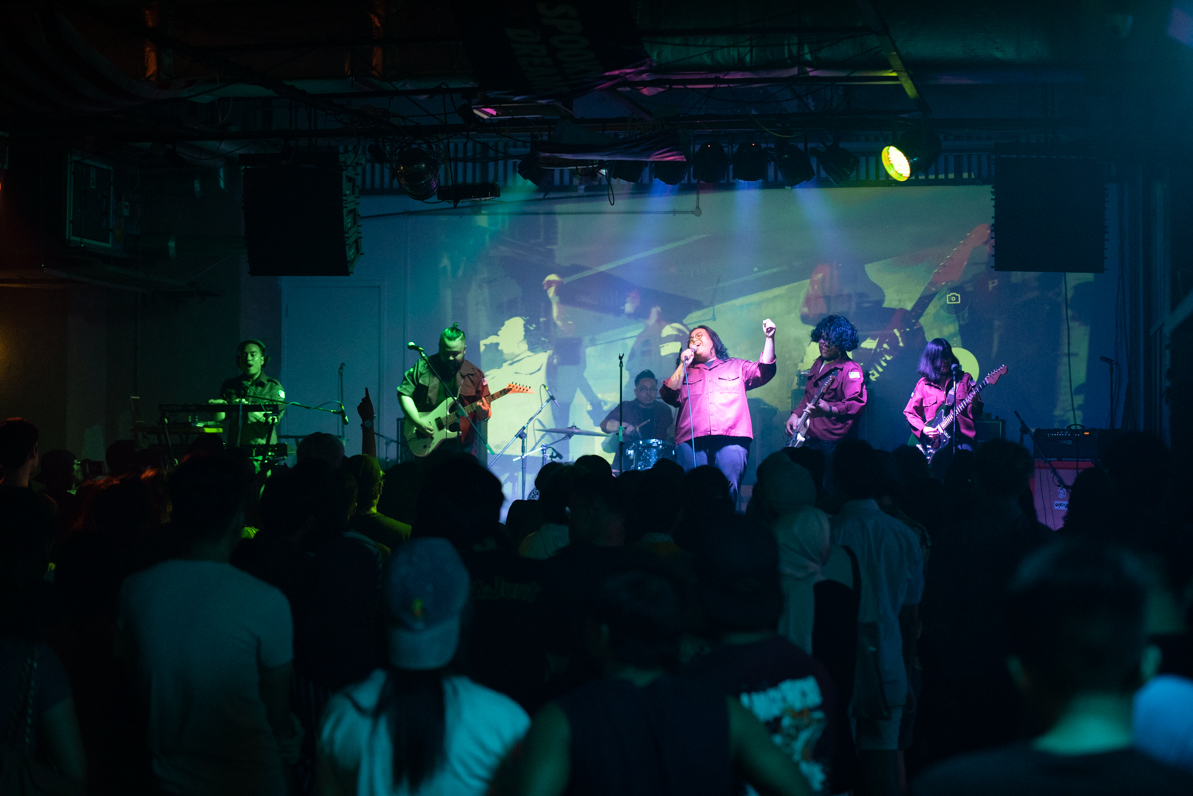Written By Aida Rashid
Picture Credits: Yung Meraki/Faiz Zaharuddin
Gone are the days where mouths are shut and hands are tied in obedience to the wealthy and the filthy. Now that we are embraced by a political accord that wouldn’t make its existence known if it was not for the change we all made on the 9th of May, 2018. Changes in the Government are a rarity in this country, and this very fact is crystallised because of the fear of getting caught under draconian laws, facing the possibility of jail time and slitting the vocal cords to a freedom of speech.
However, with great change comes great things — and it just so happens that Spooky Wet Dreams managed to capitalise on this transition with their debut album, aptly named, Koleksi Dendangan Untuk Masa Hadapan (KDUMH). It’s highly conceptual in its thematic, largely encapsulating the political climate of Malaysia Lama and Malaysia Baru. The album depicts the layman perspective of it — how politics affect our wellbeing, finances, and even relationships. It isn’t so much so of an anarchistic way of criticising the men running the country, nor anything about rebellion at all. It is more of a cry for the corrupt to fall and a call for unity amidst the waves of racial tensions that seem very much orchestrated.

Hailing from Shah Alam, Spooky Wet Dreams are Ze, Nani, Matt, Aqil, Salihin and Aiman. Spooky Wet Dreams have been around since 2013 playing random gigs they could find, also having released their debut EP ‘Cold Pizza Party’ back in 2015. Their genre is hard to pinpoint, as they play a mixture of indie rock, punk and nusantara — but we’d like to call it Malaysian rojak indie. “People call us an indie punk band recently, alt punk. I guess that’s what people think we are and we don’t deny it. If people wanna think that way.. well yeah. We’re just a band that wants to write about things people don’t talk about.” explains Ze, the vocalist of Spooky Wet Dreams, when asked about the genre of the band.
“It is more of a cry for the corrupt to fall and a call for unity amidst the waves of racial tensions that seem very much orchestrated.”
In contrast, their EP ‘Cold Pizza Party’ that was released in 2015 is very much influenced by early 2000s indie rock. The difference between KDUMH and their debut EP is very glaring, as the former incorporates more depth and significance to the context of society we live in now.
“Well I’d say that in our debut EP kitorang memang sengaja jadikan dia juvenile, kiddy, and macam main main. Even in the visuals. Kita fikir macam ni, if we don’t get this out of us now, we cannot turn back. So might as well just secrete this juvenile thing we had back then, so we don’t have to look back and we can look forward je. That’s why dia punya topics macam bodoh bodoh je you know. I’d say that we have progressed a lot, I feel like in terms of sound, catchiness, we’ve grew out of what we had during Cold Pizza Party. I think now we’re much more mature and kita ada direction.”

Rightfully so too, as the curve has ascended steeply through the issues that were touched in the album. These issues aren’t foreign to the majority of us, especially when we’re still feeling the remnants of the GE14 heat. This maturity is also depicted in a way that’s particular and meticulous about the flow of the album, making sure it tells the listener a coherent picture of what they wanted to portray. They also took their time in crafting this album, in order to make sure the story told is genuine, raw and impactful. “I think it’s around 2 years (to finish the album). We knew what the EP was like to test the waters but the album was something we actually wanted to do. During the first part, Merdekakah was the first song that we wrote and that set the tone for the rest of the album.”
The creation of the album was coincidental with the events leading up to GE14, and they seized it when the window of opportunity presented itself. Not only that, they also felt like there needed to be some sort of youth representation in the music industry. “The writing process was actually interesting, little that we knew we were writing the album based on the perkembangan semasa leading up to the general election. This was during the height of 1MDB; you could see the fall of Pakatan Rakyat dulu — basically everything was going to hell. That was one of the reasons that pushed us to write the album, because we needed to say something. People in our age group just don’t give a fuck about politics and they should — because as much as you’re not interested in politics, politics will always be interested in you.” Ze asserts.

Spooky Wet Dreams and members of Budak Nakal Hujung Simpang bowing down after the final performance
The concept of the album walks you through the layman perspective of how politics affect youth on the ground. It paints a picture of how a fence-sitter changes their mind, consequently changing status quo, and also the mundane lifestyle of a middle class person who’s constantly on survival mode. It’s interesting to delve into what exactly they aimed to portray in this concept-heavy album, especially knowing that it is daring and controversial. We talked to Ze about the concept of the album and who came up with it, “I came up with it — it’s more of like me and Nani (lead guitarist), we share a lot of the same views and we banyak talk about the issues so in the end it pushed us to write the album. The concept of the album is actually a journey of young Malaysian youth, like how I said people our age don’t usually give a fuck about politics but this time.. they do.”
The album is actually about the journey of a fence sitter who initially doesn’t care about politics, to becoming someone who’d actually go down and vote, and looking at the track listing confirms the hypothesis. The first song is called ‘Malam Sebelum Revolusi,’ highlighting the night before the election. Then it jumps to ‘Merdekakah’, like the person fikir balik ‘are we really independent? What kind of change do we need to do to get that real independence?’ Time ni dia dah set yang dia nak pergi vote tapi dia macam go through one last round of thinking. Sebelum dia pergi vote, dia ingat balik kenapa he/she decided to vote. ‘Merdekakah’ is actually the first song that we wrote, so from ‘Merdekakah’, dia realise “oh shit, are we really fucked? are we actually not independent?” and then it goes to ‘Sayang Buatkan Abang Teh (Sayang)’ from ‘Merdekakah’ to ‘Sayang’, how it jumps is, that journey’s like, meh.. things are okay, they’re not that bad. Dia terus lupa. That’s when they’re at the ignorant side of the fence. Then dia tengah lepak lepak dengan dia punya young wife, tengah minum teh and then dia tengok TV. And he’s like, wait, this is the same shit that I’ve watched for years. And he realised that, even problem pasal TV, actually roots dia go all the way to us not being able to change that. The story goes on up until ‘Irama Propaganda’ all the luahan hati dah boiled up and pent up. That’s basically the story about the album lah.”
The album kicks off with a short intro track, ‘Malam Sebelum Revolusi’ that brings about semblances of a modern day patriotic song, but instead of indulging in pride, it talks about the awareness of the people towards our mediocrity and how we deserve so much more than just being comfortable with whatever we have. As the lyrics say ‘Haruskah kita bersyukur/ hidup di Kuala Lumpur / Walau asyik terus / terus berundur”. It is then followed by the signature track of the album, ‘Merdekakah’. The conversation picks up right after ‘Malam Sebelum Revolusi’ as it picks up the conversation of questioning our freedom and the powers that continuously clamp us down.

Amid being dance-y over the illusional cover of pop, the song grieves over the lack of opportunities for the poor and the middle class to lift up their lives for the better. ‘Perdana’ talks about the lack of variety of content on TV. The sole reason of the shift from TV to Netflix is the constant repetition of the same concept in the plot, the same directors getting the autonomy to keep producing the same thing over and over again. It translates then, to giving awareness about how we are culpable in letting this happen because of our passiveness.

‘Elephant In the Room’ is the punk song of the album. It pushes forward the message of unity in an indignant manner. It is a depiction of resentment towards racists and people who use their power to pit people against each other for their own benefit. The album then wraps up with ‘Irama Propaganda,’ a song that’s cynical and brave in pointing out the messed up reality of our country, with nuances that are meant to be humorous yet awfully true.
‘Virgin’ a Vaccines-esque song and ‘Sarapan’ are Ze’s favourite songs to play. “I love ‘Virgin’ because it’s actually a story when you’re young and in love — you don’t know what you’re doing, and then you ended up having sex. It’s because you’re in a situation lacking of sex education. The problem roots to the fact that our generation were not taught to communicate in an era where technology is moving too fast we can’t catch up. Therefore it reflects in the way we view sex, how we treat sex. The second song is called ‘Sarapan’. This is based on a real story. When I wrote it I had like small quotes, “Dan bila di tengah bulan, apa kau risaukan? Kita ada sedikit wang, tapi akhir bulan bagaimana” that line was written way before I found a melody for it. Masatu I still remember I was doing so bad financially, me and Lizzie (Ze’s wife). We remember when we wanted to go makan, we had to bring coins in a container and I told Lizzie I’d forever remember that phase. It’s just painful la in general, and we’ve been through that and I think it’s something a lot of people can relate to.”

In the New Malaysia with a new sense of freedom, it is refreshing to be able to witness the celebration of constructive criticism in the form of art. KDUMH is truly a collection of tales for the future, as it paints a nuanced picture of what it feels to be part of the youth in this era. Brave, bold and relatable, it is definitely a gift we have for the next generation to ponder upon.

